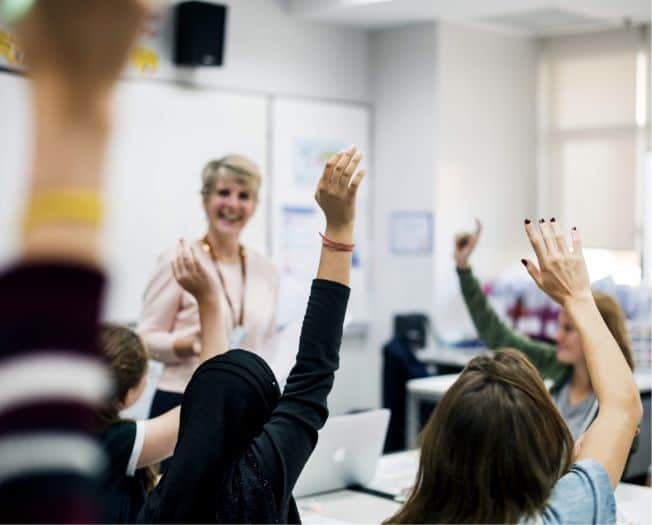
Teacher Spotlight: Jose Beltre

Teacher Spotlight: Jose Beltre
Jose Beltre is an English teacher at MEK, who teaches Nonfiction Reading, MLC Writing for Grades 6 and 7, and MLC Critical Reading for Grade 8.
The following is an interview between him and our content writer:
Teaching at MEK
Interviewer: What is your favorite part of teaching at MEK?
Beltre: I enjoy working with the students. They really want to be here, so they are more inclined to take advice, adapt their practice, and, therefore, see improvements.
Working at MEK is a nice change of pace from my usual work as a Social Studies teacher at a public school. The work at MEK is much more reflective. Through my work here, I’ve become a better speaker, writer, and overall communicator. MEK helps me develop aspects of my teaching that make me more polished.
I also like MEK’s challenging curriculum. There are certain items on the MEK curriculum that are usually glossed over in a public school classroom, like grammar rules. But at MEK, we put an emphasis on grammar and how it connects to writing. We are able to fully explain different grammatical structures, and the students are able to use what we teach to strengthen their writing.
Teaching Outside of MEK
Interviewer: You mentioned that you’re a Social Studies teacher at a public school. Where do you teach?
Beltre: I teach 7th and 8th grade Social Studies at a public school in West New York. It’s actually my home town. The student population is majority Latino from blue collar homes. And the group of students I teach there have a different mindset than the students I teach at MEK.
I usually teach the same group of students for two years. So, I receive them in 7th grade and graduate them as 8th graders. This coming year I have 8th graders. Both grades have their advantages. The 7th graders are a little more malleable, while the 8th graders are more mature.
Interviewer: What inspired you to become a teacher?
Beltre: Growing up, I loved history. I remember finding my cousin’s world history books and reading through them.
Then, when I was in the 8th grade, I had this really wonderful history teacher. She was really phenomenal because she was relatable. I was inspired by her. And it is because of her that I wanted to make history fun and relatable for students. This became my credo and goal during my freshman year of high school. I wanted to take a subject that most students find boring and make it palatable.
I mentioned this to my MLC 7 Writing class when I taught them about compositional risk. As a writer, it is so important to make connections between the work you are analyzing and your interpretation of that work. It’s the connection that makes a piece of writing relatable. Same with history. It’s important to make connections between the past and the present. And I’ve found that most times when I do that students will tell me they never thought about a certain event in “that way”.
Favorite Lessons
Interviewer: Are there certain lessons that you love to teach?
Beltre: At MEK, I enjoy teaching figurative language through the Critical Reading passages and showing students how to develop that skill in their own writing. Those types of lessons encourage students to be creative and think outside the box.
For instance, in my MLC 6 class, we worked on personification. I told them to write the personification of a flower. The assignment was a tough one, but some of the student writing was very good. I like to push the students at MEK out of their comfort zones. They were challenged, and I could see them thinking hard about what to write. They ultimately produced some really amazing pieces. So, teaching figurative language is always fun.
For MLC Writing, I enjoy teaching students how to write introductions. Even when I was a student, I found it difficult to write a strong introduction and conclusion to an essay. I share my own stories and experiences about the writing journey with students to encourage them. I show them how to write compelling rhetorical questions and interesting facts to open an essay. Then, they work on closing out their essay by relating back to the intro. I consider this my own personal challenge as a writer. And I tell students that if I can do this, then you can do this.
The Key to Becoming a Better Reader and Writer
Interviewer: What is the key to becoming a better writer?
Beltre: Becoming a better writer takes practice. You need to write as much as possible. It can be an essay, an email, a sentence, a paragraph, or even a note to your parents, but you need to write. Then, you need to look over what you wrote and reflect on it.
You aren’t going to write a perfect first draft of an essay. It takes many drafts before an essay is polished. That takes rereading your writing, reflecting on your work, and making the necessary edits to make it great. It’s like when you read a book for the first time; you miss things you won’t get on subsequent readings. In revising, a writer will see that a sentence may have looked good the first time but realize that it does not fit or needs to be changed after looking it over with a clear eye. With writing, repetition and writing as much as possible are key.
Interviewer: How do you build students’ reading skills?
Beltre: I try to impress the necessity of writing as you read. Students should use their pens to “talk to the text”. I always tell students that a piece of text will give them information but won’t tell them what that information is. Therefore, they need to decipher what’s important about a work or passage. This means rereading texts to disseminate questions that are posed that they may have missed during a first reading.
If students annotate as they read, the likelihood that they will have to go back into the text frantically looking for an important passage or quote lessens. I show them the skill and encourage them to annotate as much as possible. Whether they are highlighting a passage that didn’t make sense or underlining a quote that stood out, I tell them to make a note in the text and go back to it later. If students make a point of doing this, they’ll get so much more of the works they are reading.
Interviewer: How do you build their stamina to keep up with the practice of repeating skills?
Beltre: That’s a team effort. It helps that the other teachers at MEK encourage the same skills and strategies that I use in my classroom. Since everyone is on the same page with utilizing best practices, we are all streamlined, which makes it easier. So, the students get consistent practice with skills no matter which class they are in.
MLC & BCA Prep
Interviewer: How do you prepare students in MLC Critical Reading 8 for BCA?
Beltre: I make sure the essays students are writing tackle BCA prompts. In class, we work on using effective hooks in their introduction and using their thesis statement to make real world connections. Also, we focus on citing and analyzing evidence, then using the analysis of the evidence to connect back to the thesis statement in the intro.
Interviewer: What’s your advice for students taking the BCA admissions test?
Beltre: The advice I give to my students is to work with the texts you are given to the best of your ability. Use the text to help you create ideas, but don’t rely on it heavily. You need to find a happy balance between working the text and using strong evidence in your writing. Explain what the text means in your own words with flair and creativity.
And, of course, practice. Go through the writing process as diligently as possible. Make sure you are catching mistakes.
The writing portion of the BCA exam is a 40 minute section that can make or break a students’ ability to join this prestigious public school. The repetition and practice may feel boring and monotonous. But if students use their study sessions the right way and master reading and writing skills, they’ll get a huge reward.
Free Time
Interviewer: What do you like to do outside of MEK?
Beltre: Aside from raising my son, I love playing video games, watching anime, and reading manga. I also enjoy listening to various podcasts.
Interviewer: Is there a particular video game that you love?
Beltre: I enjoy the more old school games. I grew up playing Super Mario Brothers, but I always was more of a fighting game guy. So, I’ll play the occasional Street Fighter. I’m also into sports games and role playing games like Skyrim.
Current Read
Interviewer: What are you currently reading?
Beltre: I’m currently reading The Wheel of Time by Robert Jordan. It’s the series that inspired George R.R. Martin to write Game of Thrones. It’s a massive series, but I wanted to read it at least once in my life. It’s an exciting read. Whenever I have time I’ll sit and read for hours.



